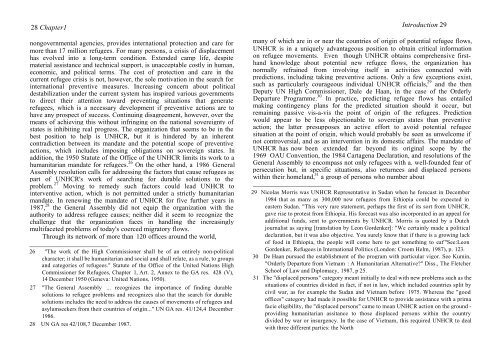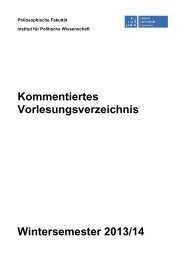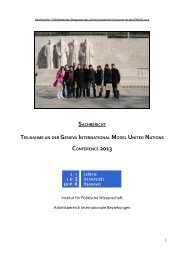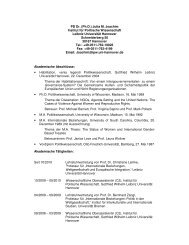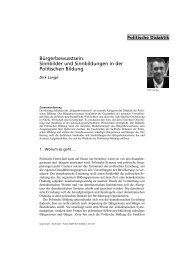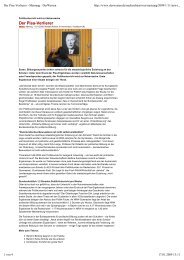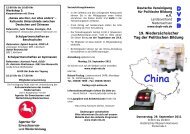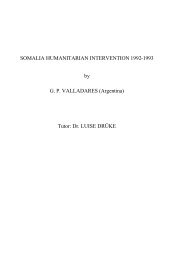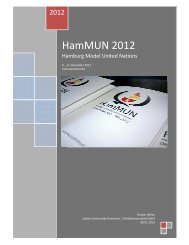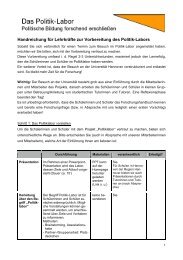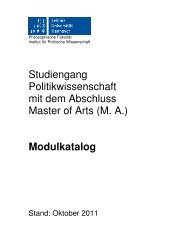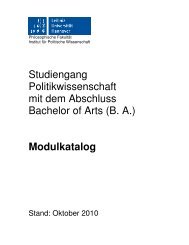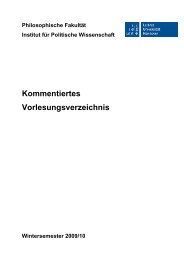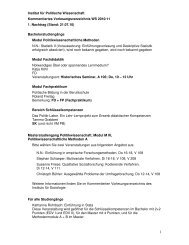Preventive Action for Refugee Producing Situations
Preventive Action for Refugee Producing Situations
Preventive Action for Refugee Producing Situations
Create successful ePaper yourself
Turn your PDF publications into a flip-book with our unique Google optimized e-Paper software.
28 Chapter1<br />
nongovernmental agencies, provides international protection and care <strong>for</strong><br />
more than 17 million refugees. For many persons, a crisis of displacement<br />
has evolved into a long-term condition. Extended camp life, despite<br />
material assistance and technical support, is unacceptable costly in human,<br />
economic, and political terms. The cost of protection and care in the<br />
current refugee crisis is not, however, the sole motivation in the search <strong>for</strong><br />
international preventive measures. Increasing concern about political<br />
destabilization under the current system has inspired various governments<br />
to direct their attention toward preventing situations that generate<br />
refugees, which is a necessary development if preventive actions are to<br />
have any prospect of success. Continuing disagreement, however, over the<br />
means of achieving this without infringing on the national sovereignty of<br />
states is inhibiting real progress. The organization that seems to be in the<br />
best position to help is UNHCR, but it is hindered by an inherent<br />
contradiction between its mandate and the potential scope of preventive<br />
actions, which includes imposing obligations on sovereign states. In<br />
addition, the 1950 Statute of the Office of the UNHCR limits its work to a<br />
humanitarian mandate <strong>for</strong> refugees. 26 On the other hand, a 1986 General<br />
Assembly resolution calls <strong>for</strong> addressing the factors that cause refugees as<br />
part of UNHCR's work of searching <strong>for</strong> durable solutions to the<br />
problem. 27 Moving to remedy such factors could lead UNHCR to<br />
interventive action, which is not permitted under a strictly humanitarian<br />
mandate. In renewing the mandate of UNHCR <strong>for</strong> five further years in<br />
1987, 28 the General Assembly did not equip the organization with the<br />
authority to address refugee causes; neither did it seem to recognize the<br />
challenge that the organization faces in handling the increasingly<br />
multifaceted problems of today's coerced migratory flows.<br />
Through its network of more than 120 offices around the world,<br />
_______________________<br />
26 "The work of the High Commissioner shall be of an entirely non-political<br />
character; it shall be humanitarian and social and shall relate, as a rule, to groups<br />
and categories of refugees." Statute of the Office of the United Nations High<br />
Commissioner <strong>for</strong> <strong>Refugee</strong>s, Chapter 1, Art. 2, Annex to the GA res. 428 (V),<br />
14 December 1950 (Geneva: United Nations, 1950).<br />
27 "The General Assembly ... recognizes the importance of finding durable<br />
solutions to refugee problems and recognizes also that the search <strong>for</strong> durable<br />
solutions includes the need to address the causes of movements of refugees and<br />
asylumseekers from their countries of origin..." UN GA res. 41/124,4 December<br />
1986.<br />
28 UN GA res 42/108,7 December 1987.<br />
Introduction 29<br />
many of which are in or near the countries of origin of potential refugee flows,<br />
UNHCR is in a uniquely advantageous position to obtain critical in<strong>for</strong>mation<br />
on refugee movements. Even though UNHCR obtains comprehensive firsthand<br />
knowledge about potential new refugee flows, the organization has<br />
normally refrained from involving itself in activities connected with<br />
predictions, including taking preventive actions. Only a few exceptions exist,<br />
such as particularly courageous individual UNHCR officials, 29 and the then<br />
Deputy UN High Commissioner, Dale de Haan, in the case of the Orderly<br />
Departure Programme. 30 In practice, predicting refugee flows has entailed<br />
making contingency plans <strong>for</strong> the predicted situation should it occur, but<br />
remaining passive vis-a-vis the point of origin of the refugees. Prediction<br />
would appear to be less objectionable to sovereign states than preventive<br />
action; the latter presupposes an active ef<strong>for</strong>t to avoid potential refugee<br />
situation at the point of origin, which would probably be seen as unwelcome if<br />
not controversial, and as an intervention in its domestic affairs. The mandate of<br />
UNHCR has now been extended far beyond its original scope by the<br />
1969 OAU Convention, the 1984 Cartagena Declaration, and resolutions of the<br />
General Assembly to encompass not only refugees with a. well-founded fear of<br />
persecution but, in specific situations, also returnees and displaced persons<br />
within their homeland, 31 a group of persons who number about<br />
_______________________<br />
29 Nicolas Morris was UNHCR Representative in Sudan when he <strong>for</strong>ecast in December<br />
1984 that as many as 300,000 new refugees from Ethiopia could be expected in<br />
eastern Sudan. "This very rare statement, perhaps the first of its sort from UNHCR,<br />
gave rise to protest from Ethiopia. His <strong>for</strong>ecast was also incorporated in an appeal <strong>for</strong><br />
additional funds, sent to governments by UNHCR. Morris is quoted by a Dutch<br />
journalist as saying [translation by Leon Gordenker]: "We certainly made a political<br />
declaration, but it was also objective. You surely know that if there is a growing lack<br />
of food in Ethiopia, the people will come here to get something to eat'"See:Leon<br />
Gordenker, <strong>Refugee</strong>s in International Politics (London: Croom Helm, 1987), p. 123.<br />
30 De Haan pursued the establishment of the program with particular vigor. See Kumin,<br />
"Orderly Departure from Vietnam : A Humanitarian Alternative?" Diss., The Fletcher<br />
School of Law and Diplomacy, 1987, p 25.<br />
31 The "displaced persons" category meant initially to deal with new problems such as the<br />
situations of countries divided in fact, if not in law, which included countries split by<br />
civil war, as <strong>for</strong> example the Sudan and Vietnam be<strong>for</strong>e 1975. Whereas the "good<br />
offices" category had made it possible <strong>for</strong> UNHCR to provide assistance with a prima<br />
facie eligibility, the "displaced persons" came to mean UNHCR action on the ground -<br />
providing humanitarian assitance to those displaced persons within the country<br />
divided by war or insurgency. In the case of Vietnam, this required UNHCR to deal<br />
with three different parties: the North


